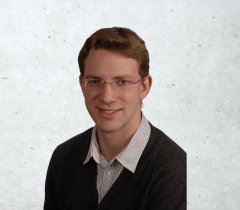
Christoph Wenig, BSc
Alumni Industrial Engineering & Management, study year 2010
- What did you like in particular about studying in the Industrial Engineering & Management program at FH Kufstein Tirol?
I really liked studying here. Before starting, you obviously worry a lot about the university and the degree program. But in the end, the warm atmosphere, the interactive learning in small groups and the international orientation were what made me decide for the program, and I have never regretted my decision. What I liked in particular were the technical courses, integrated CAD and construction exercises, which in this form are only doable at a university of applied sciences.
- How did the personal relationship between students and lecturers influence your experience of the degree program?
The personal relationship between students and teachers—that is, what creates the warm atmosphere—is a unique characteristic of the Kufstein University of Applied Sciences. It is important to mention that the cohesion among students is very strong due to the small numbers of student within single courses. We support each other, and we work on developing innovative ideas together. The lecturers support the students in their efforts and take questions and sometimes also criticism. My fellow students and I were the first year group of the Industrial Engineering & Management program at the Kufstein University of Applied Sciences, so we could adjust the course content to our interests a little bit. Personally, I saw the confidential relationship with the program director as very important. It confirmed my efforts and motivated me. The lecturers also give a deep insight into life in the workplace and further training options, so they act as guides for the students.
- What did you think about the practical parts of the degree program (projects within companies, bachelor´s thesis, excursions, external lecturers)?
The importance of including a lot of practical work in the Industrial Engineering & Management curriculum cannot be stressed enough. The lack of research facilities of our university compared to large universities is compensated for by the contacts with industry in our region. Two case studies were carried out as cooperative projects with businesses, which meant that we had to adapt our work to the client's objectives. Of course, doing courses and such project work at the same time result in a considerable workload. It does, however, pay off when you see that project results continue to be used. For me as a student, it was also interesting to hold a position of project manager. Such experiences do benefit you a lot. It also shapes your character. Exchanging experiences with external lecturers and while on excursions additionally reinforces new impressions. The Bachelor's thesis with its link to practical issues is the concluding element allowing you to apply your knowledge. Often, contacts with businesses established during the program can then, when starting a career, be used to solicit them for employment.
- Which specialization did you choose for your degree?
I chose process technology as my specialization. I enjoy finding logical links and analytically assessing processes. The Kufstein University of Applied Sciences not only teaches basic logistics or production systems, but also about the cross-connections of logistics and production systems to plant construction and engineering or products' life cycles.
- Where did you go for the compulsory semester abroad?
I did my semester abroad at the Institute of Management Technology Ghaziabad in India. I was very keen on learning about Asian culture, and India, with its different social classes, had a particular charm.
- What could you take home from your semester abroad?
A lot. I think that because of the country that I chose, I learned more personally than professionally. You experience a completely new culture and way of life, and you have to get involved with it. This is reflected in the simple things of everyday life: washing, eating and travelling. But also cooperating with the local students or with other exchange students is a very different experience compared to what you are used to. I, for example, would never have thought it possible to do successful group work in a library after midnight. In terms of the teaching, it was interesting to have an outsider’s perspective on it. The Asian culture has a lot of respect for industrial achievements in the German-speaking world and tries to learn from our knowledge. I as an exchange student, on the other hand, could study the Indian market and identify suitable marketing strategies. However, such a semester abroad does teach you mostly about yourself.
- Would you recommend the Industrial Engineering & Management degree program to other people?
I would generally recommend this program to anybody who is interested in it. In fact, I did recommend it to people in the past. The program gives you broad knowledge in engineering, and I think there is a good and sensible balance between the depth of knowledge and the practical application thereof. What I would like to stress is the teamwork and presentation soft skills, the English language skills and methodological skills that you learn and that allow you to work your way into nearly any topic area by yourself. I think that is one of our main advantages over normal university students who, very often, focus too much on their extensive theoretical expertise without being able to apply it. The Kufstein University of Applied Sciences program's highlight is definitely the semester abroad in the curriculum.
- What do you do currently in your job? Which company do you work for?
I am currently doing the Industrial Engineering & Management Master's degree program with a specialization on logistics and production management at the University of Bremen. The past semester I spent in England, where I worked on a life cycle service project upgrade for a German mechanical engineer. This job was an extension of the compulsory industry internship I did as part of my Bachelor's degree program.